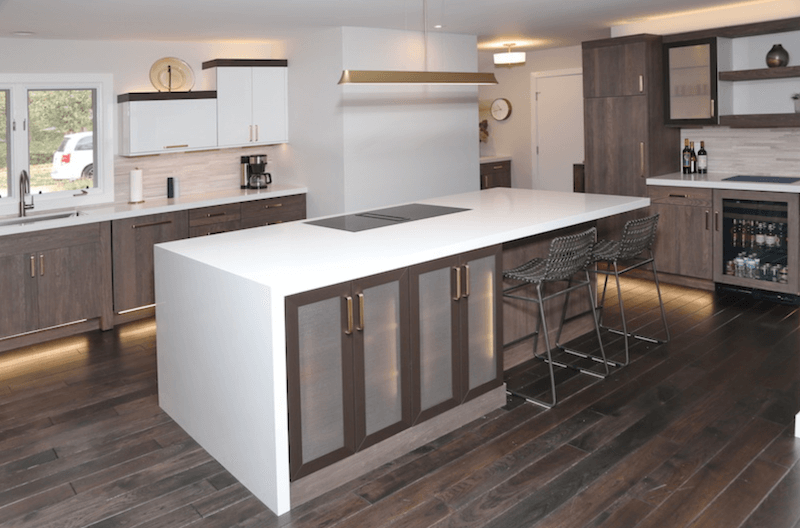Best Way to Clean and Disinfect Countertops by Material
Your remodel gives you the kitchen of your dreams—and you want to keep it that way as long as possible. You also want a clean, germ-free kitchen. While your thoughts may go to harsh chemical cleaners when it comes time to get rid of germs and mildew, your countertops require a gentler approach! Abrasive cleaners may damage and shorten the life of your new kitchen. So how can you care for your new countertops and keep them sparkling? We will break down general rules (and benefits!) by countertop type to protect both your countertops and your health!

General Countertop Cleaning Instructions
While every type of stone offers unique benefits, we can recommend general care that applies to all types.
- Use warm soap and water for everyday use.
- We recommend a manufacturer dish soap, like Dawn or Palmolive. Avoid green or natural brands as those contain an oil that can leave a residue on a quartz surfaces over time.
- For deeper cleaning, use a mild, non-abrasive kitchen cleanser. Formula 409, Fantastic, Lysol, and Mr. Clean all have various non-abrasive products for countertops.
- Clean using a microfiber cloth.
- Rinse the cloth occasionally as you go to prevent spreading germs and dirty suds around.
- When finished, dry using a separate microfiber cloth to eliminate streaks.
Cleaning Granite Countertops
Granite is a popular choice, as it offers hundreds of beautiful colors and patterns, and each slab is unique! As a natural stone, granite is porous and not impervious to moistures, although it is resistant to stains and bacteria when sealed properly. Clean following the instructions above. One note with granite—do not use any products with lemon, vinegar, acids, or abrasives, as these can damage the stone or sealant.
Granite Care and Maintenance Guide
Cleaning Corian Countertops
Corian offers a seamless look with an ever evolving palate of colors patterns and finishes. Corian is extremely durable. The non-porous surface repels moisture, prevents stains from penetrating, and resists mold, mildew, and bacteria growth with proper cleaning. Follow the general care instructions above. Avoid window cleaner, as it can dull the surface of Corian. Per their care instructions, you can occasionally disinfect with with diluted household bleach – 1:100 (5 Tbsp. of bleach to 1 gallon of water, as recommended by the Centers for Disease Control and Prevention for disinfection of surfaces).
Corian Care and Maintenance Guide
Cleaning Quartz Countertops
Quartz is a strong material with a beautiful selection of colors and patterns. It is hygienic, as it doesn’t absorb germs or bacteria! Quartz is non-porous, so it does not allow microscopic elements to get through. When properly cleaned, quartz doesn’t support the growth of mold or mildew. Because it is resilient, you can use harsher materials than on other countertop materials—glass cleaner and ammonia are acceptable. If you use ammonia, remember not to mix with vinegar, as the two can have dangerous chemical reactions. (However, soap and water are still recommended for daily cleanings.)
Each quartz manufacturer has their own cleaning recommendations. Note that directions can be very different from one another—know your brand and follow instructions accordingly. Below, you can download quartz recommendations by brand.
Quartz Guides by Brand
Hanstone Quartz
Cambria Quartz
Corian Quartz
Caesarstone Quartz
We know you love your new kitchen, and we want you to be able to continue to love it for a long time! If you need more information, or are interested in learning more about new countertops or a total kitchen remodel, contact your nearest Seigle’s today.
Sign Up For Our Elist
Make An Appointment
Show Room Tours
Latest Seigle's News »
Supporting PADS of Elgin through a Supply Drive
At Seigle’s, we love and appreciate the communities in the Chicagoland...
Read More




